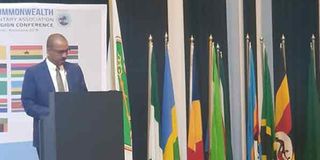Use your influence to curb human trafficking; Z’bar house rep urges African lawmakers

Zanzibar Member of House of Representatives, Mr Simai Mohammed Said delivers a speech during the 49th conference of the Commonwealth Parliamentary Association (CPA) in Gaborone, Botswana recently.
What you need to know:
- During the just-ended conference of the Commonwealth Parliamentary Association (CPA) in Gaborone, Botswana, Mr Simai called on MPs across the continent to use their power to fight all acts related to modern-day slavery.
Dar es Salaam. The Zanzibar Member of House of Representatives, Mr Simai Mohammed Said is rallying the support of parliamentarians in African countries to press for increased investment in curbing human trafficking on the continent.
During the just-ended conference of the Commonwealth Parliamentary Association (CPA) in Gaborone, Botswana, Mr Simai called on MPs across the continent to use their power to fight all acts related to modern-day slavery.
He made reference to reports by the Inter-Parliamentary Union (IPU) which insist that parliamentarians should use their influence to ensure that governments are committing more funds in combating child trafficking.
“It is time for us (parliamentarians) to manage the rules we have made ourselves. Our people are being abused by this illegal business; human rights are being violated for beneficiaries of few people,’’ he noted in his speech at the 49th CPA conference.
“It is therefore significant to improve our oversight role to our respective governments to ensure that they increase their performance towards the implementation of the laws against human trafficking,’’ added the Isles house rep.
Measures that can be taken
Mr Simai suggested in a speech he made to fellow lawmakers at the conference that some of the measures can be by establishing rehabilitation centers to assist victims of human trafficking, especially women and children and ensure their safety, protection and facilitate their recovery and social reintegration.
There is a need for African countries to review their laws that are meant to combat human trafficking in order to ensure that such laws are relevant and up to date, reads part of his speech.
“For instance, the issue of punishment for perpetrators of human trafficking offences should be reviewed to ensure that adequate punishment is imposed to those perpetrators,’’ he added.
Human trafficking has been practiced in different countries including Tanzania, where a significant number of women are taken with unreliable contracts to abroad especially Middle East for house maid jobs.
International agencies have documented cases where the victims return home with empty hands; just narrating their life lasting humiliating stories.
The vice is spreading globally and African continent is not exempted, said Simai, referring to current statistics by global agencies.
According to the Global Report on Trafficking in Persons, the most common form of human trafficking (79 percent) is sexual exploitation.
The victims of sexual exploitation are predominantly women and girls. Surprisingly, in 30 percent of the countries which provided information on the gender of traffickers, women make up the largest proportion of traffickers.
Other forms is forced labour (18 percent), although this may be a misrepresentation because forced labour is less frequently detected and reported than trafficking for sexual exploitation. It is said 20 percent of all trafficking victims are children.




